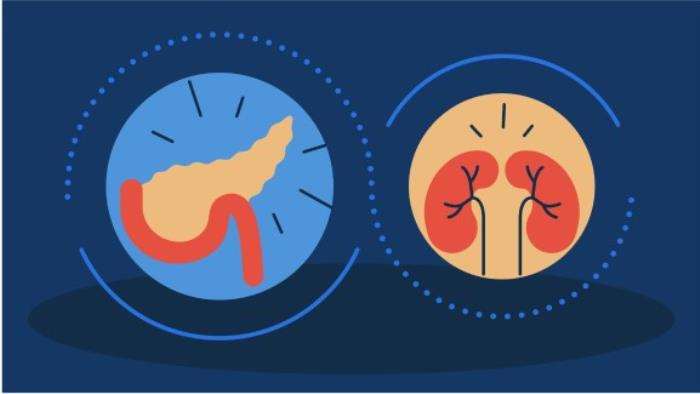Pancreas transplantation is a surgical procedure aimed at treating patients with type 1 diabetes and associated complications. The primary goal is to restore insulin production by replacing the non-functioning pancreas with a healthy one from a deceased donor or, in some cases, from a living donor. This procedure is particularly beneficial for patients who experience severe complications, such as diabetic nephropathy or kidney failure, as it can improve overall metabolic control and quality of life.
Medical disclaimer: This content is for general awareness and does not replace a doctor’s consultation. For diagnosis or treatment decisions, consult a qualified specialist.
Indications for Pancreas Transplantation
Pancreas transplantation is indicated for patients with uncontrolled diabetes despite optimal medical management, particularly those with complications like end-stage renal disease (ESRD). It is also considered for patients with recurrent severe hypoglycemia or those who are candidates for kidney transplantation. The procedure can be performed simultaneously with kidney transplantation, which is often referred to as a simultaneous pancreas-kidney (SPK) transplant.
Benefits of Pancreas Transplantation
The primary benefits of pancreas transplantation include the restoration of normal insulin production, improved glycemic control, and reduced risk of long-term complications associated with diabetes. Furthermore, patients often experience an enhanced quality of life and reduced dependency on insulin therapy. For those with concurrent kidney disease, a successful transplant can significantly improve renal function and overall survival rates.

Potential Risks and Complications
As with any surgical procedure, pancreas transplantation carries potential risks. These include surgical complications, such as bleeding, infection, and thrombosis. Additionally, recipients must take immunosuppressive medications to prevent organ rejection, which can increase the risk of infections and malignancies. Long-term complications may also arise, necessitating careful monitoring and management.
Impact of Pancreas Transplant on Kidney Function
One of the significant impacts of pancreas transplantation is its effect on kidney function. In patients with diabetes-related kidney disease, restoring normal insulin production can lead to improved metabolic control, which may halt or even reverse the progression of diabetic nephropathy. Studies indicate that pancreas transplantation can stabilize or enhance kidney function in many recipients, particularly those who undergo simultaneous pancreas-kidney transplantation.
Mechanism of Action: How Pancreas Transplant Affects Kidneys
The mechanism by which pancreas transplantation influences kidney function is multifactorial. Improved glycemic control reduces the risk of hyperglycemia-induced kidney damage. Moreover, the restoration of insulin production helps regulate various metabolic pathways, including those involved in glomerular filtration and tubular function. Consequently, patients may experience reduced proteinuria and improved renal parameters post-transplant.
Simultaneous Pancreas-Kidney Transplantation
Simultaneous pancreas-kidney transplantation (SPK) is a preferred approach for patients with end-stage renal disease due to diabetes. This strategy allows for comprehensive management of both the pancreas and kidneys, addressing the complications of diabetes holistically. Research indicates that SPK leads to better long-term outcomes compared to separate transplants, as it minimizes the duration of dialysis and enhances overall metabolic health.

Factors Influencing Kidney Function Post-Transplant
Several factors influence kidney function following pancreas transplantation. These include the quality of the donor organ, the recipient's baseline kidney function, and adherence to immunosuppressive therapy. Additionally, the presence of comorbid conditions such as hypertension and cardiovascular disease can further complicate renal outcomes. Regular follow-up and monitoring are essential to optimize kidney health post-transplant.
Monitoring Kidney Function After Transplant
Post-transplant monitoring of kidney function is critical for detecting any potential complications early. This typically involves regular blood tests to assess serum creatinine levels, glomerular filtration rate (GFR), and urine analysis for protein levels. Healthcare providers may also utilize imaging studies to evaluate kidney anatomy and function. Early identification of issues can lead to timely interventions, preserving kidney health.
Long-Term Outcomes of Pancreas Transplantation
Long-term outcomes for pancreas transplant recipients are generally favorable, particularly when the transplant is successful. Studies demonstrate that patients often experience significant improvements in both metabolic control and quality of life. However, the long-term function of the transplanted pancreas and kidneys can vary, and ongoing medical care is essential to manage complications and monitor organ health effectively.
Immunosuppression and Its Role in Kidney Function
Immunosuppressive therapy is crucial to prevent transplant rejection but can also impact kidney function. The choice of immunosuppressants and their dosages must be carefully managed to minimize nephrotoxic effects while ensuring adequate immunosuppression. Regular monitoring of renal function is essential to adjust medication regimens and prevent potential kidney injury due to immunosuppressive agents.
Dietary Considerations Post-Transplant
Post-transplant dietary management is vital for maintaining optimal kidney function and overall health. A balanced diet low in sodium, saturated fats, and simple sugars is recommended to support kidney health and manage blood sugar levels. Patients should also be educated about the importance of hydration and the potential impact of certain foods on immunosuppressive medications. Nutritional counseling can play a significant role in post-transplant recovery.
Exercise and Lifestyle Modifications
Incorporating regular physical activity and lifestyle modifications is essential for transplant recipients. Exercise can enhance cardiovascular health, improve metabolic control, and support kidney function. Patients are encouraged to engage in moderate aerobic activities and strength training, tailored to their individual capabilities. Lifestyle changes, such as smoking cessation and stress management, are also critical for long-term success post-transplant.
Psychosocial Aspects of Transplantation
The psychosocial impact of pancreas transplantation should not be overlooked. Patients may experience a range of emotions post-transplant, including anxiety and depression. Access to mental health support and counseling can help address these issues, promoting adherence to medical regimens and improving overall quality of life. Family involvement and support systems play a crucial role in the psychosocial recovery process.
Research and Future Directions in Pancreas Transplantation
Ongoing research in pancreas transplantation focuses on improving surgical techniques, enhancing immunosuppressive protocols, and exploring the use of stem cell therapies and bioengineered organs. Advances in understanding the mechanisms of rejection and tolerance may lead to improved outcomes and reduced complications for recipients. Future directions also include optimizing patient selection criteria and enhancing post-transplant care strategies.
Patient Education and Support Resources
Patient education is a critical component of successful pancreas transplantation. Comprehensive education on the transplant process, medication adherence, and lifestyle modifications can empower patients to take an active role in their health. Support resources, including transplant support groups and educational materials, can provide valuable information and foster a sense of community among recipients.
Comparative Outcomes: Pancreas vs. Kidney Transplant Alone
Comparative studies indicate that patients undergoing pancreas transplantation in conjunction with kidney transplantation often experience better long-term outcomes than those receiving kidney transplants alone. The dual transplant approach not only addresses the complications of diabetes but also improves overall metabolic health, leading to enhanced renal function and reduced risk of complications.
Life After a Pancreas Transplant: Recovery and Lifestyle Changes
Discover what life is like after a pancreas transplant. This blog delves into recovery timelines and essential lifestyle adjustments to ensure long-term health and transplant success.
Challenges in Accessing Pancreas Transplantation
Access to pancreas transplantation can be limited by several factors, including donor organ availability, stringent eligibility criteria, and geographic disparities in transplant centers. Patients may face long wait times for suitable donor organs, which can impact their overall health. Advocacy for increased organ donation and improved transplant policies is essential to enhance access to pancreas transplantation for those in need.
Best Pancreas Transplant in India
The Best Pancreas Transplant in India provides a life-changing solution for patients with severe diabetes or pancreatic dysfunction, restoring insulin production and improving overall health.
Best Pancreas Transplant Hospitals in India
The Best Pancreas Transplant Hospitals in India feature world-class infrastructure and skilled transplant teams, offering high success rates and comprehensive post-operative care.
Pancreas Transplant Cost in India
The Pancreas Transplant Cost in India is affordable, ensuring access to cutting-edge treatments with transparent pricing and tailored care plans for international and domestic patients.
Best Pancreas Transplant Surgeons in India
The Best Pancreas Transplant Surgeons in India are renowned for their expertise and precision, delivering successful outcomes through innovative surgical techniques and personalized patient care.
FAQs
What is the primary purpose of pancreas transplantation?
The primary purpose of pancreas transplantation is to restore insulin production in patients with type 1 diabetes, improving metabolic control and reducing complications associated with the disease.
How does pancreas transplantation affect kidney function?
Pancreas transplantation can improve kidney function, especially in patients with diabetes-related kidney disease, by restoring normal metabolic control and halting the progression of diabetic nephropathy.
What are the risks associated with pancreas transplantation?
Risks include surgical complications, such as infection and bleeding, as well as long-term risks related to immunosuppressive therapy, including increased susceptibility to infections and potential kidney injury.
How is kidney function monitored after pancreas transplantation?
Kidney function is monitored through regular blood tests to assess serum creatinine levels and glomerular filtration rate (GFR), along with urine analysis for protein levels.
What lifestyle changes are recommended post-transplant?
Patients are encouraged to adopt a balanced diet, engage in regular exercise, and make lifestyle modifications such as smoking cessation to support kidney and overall health post-transplant.
After a pancreas transplant, following specific dietary guidelines is essential for recovery and long-term success. Key recommendations include maintaining a balanced diet with fruits, vegetables, whole grains, and lean proteins while avoiding high-fat and greasy foods. It's advisable to eat small, frequent meals and stay hydrated by drinking plenty of fluids, although avoiding large amounts during meals is important. Emphasize food safety to prevent foodborne illnesses by following strict hygiene and cooking practices. Avoid high-risk foods, especially in the first six months post-transplant, and regularly monitor blood sugar levels. Engage in regular physical activity to enhance fitness and prevent blood clots, starting with light exercises and gradually increasing intensity. Nutrition and Diet Guidelines After Pancreas Transplant
: After a pancreas transplant, the recovery process involves several stages, including immediate post-operative care, monitoring for complications, and long-term management. Patients need to take immunosuppressant medications for life to prevent organ rejection1. Adopting a balanced diet, staying physically active, and regularly monitoring health are crucial for maintaining the transplant's success and overall well-being. Weight gain is common in the first year due to medication side effects and increased appetite, so maintaining a healthy diet and exercise routine is essential. Regular check-ups and vigilance for signs of complications, such as infection or organ rejection, are vital for long-term health. Life After a Pancreas Transplant Recovery and Lifestyle Changes
Updated for 2025 – Discover the best hospitals in India for pancreas transplant procedures, including top choices, advanced techniques, and cost-effective options. Pancreas Transplant Cost in India